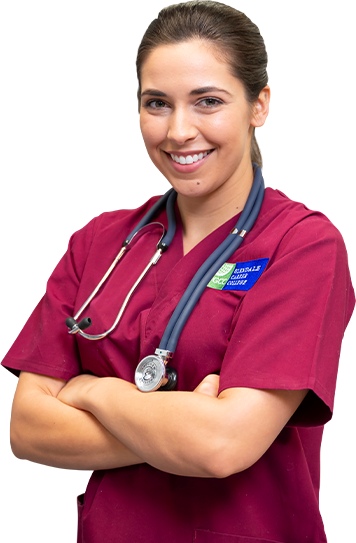Medical Assistant
Every day, more people are in need of health care services, which means there are more career opportunities in the health care industry than ever before, too.
Medical Assistants are trained allied health care workers who take on tasks and procedures to support the work of doctors and other health care professionals.
Discover how you can become a Medical Assistant and work alongside physicians, registered nurses and other medical professionals in a clinic, doctors’ office, or other health care facility.
Enroll at any of our schools and campuses located in Glendale and San Diego — near Burbank, Pasadena, Hollywood, Los Angeles and beyond.
You may also check out other training programs and courses available here.

Medical Assistant
Medical Assistant Overview
Medical Assistants take on administrative and clinical duties to support doctors, registered nurses, and other medical professionals in doctors’ offices, clinics, hospitals, and other health care facilities.
Medical Assistants regularly carry out a number of crucial tasks, including:
The Medical Assistant program at Glendale Career College equips students with the knowledge and training they need to start working in a health care or medical office, including medical clinics, doctors’ offices, HMOs, rehabilitation centers, hospitals and other health care facilities.
*Glendale Career College is not able to guarantee employment.
Proudly accredited, licensed to operate and/or recognized by the following institutions:

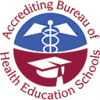

Enroll at any of our schools and campuses located in Glendale, San Diego, near Burbank, Pasadena, Hollywood, Los Angeles, and more!
The Medical Assistant program can be taken at the following campuses:
Meet a Graduate
Questions?
Let us help you launch your career by contacting us today. Simply fill out our contact form or call us at 800-639-3384.
Classes are starting soon!
Medical Assistant Careers & Work Environment
The Medical Assistant program at Glendale Career College provides the education and training needed to begin a career working in a variety of different medical and health care facilities.
Graduates of the program routinely find jobs working in:
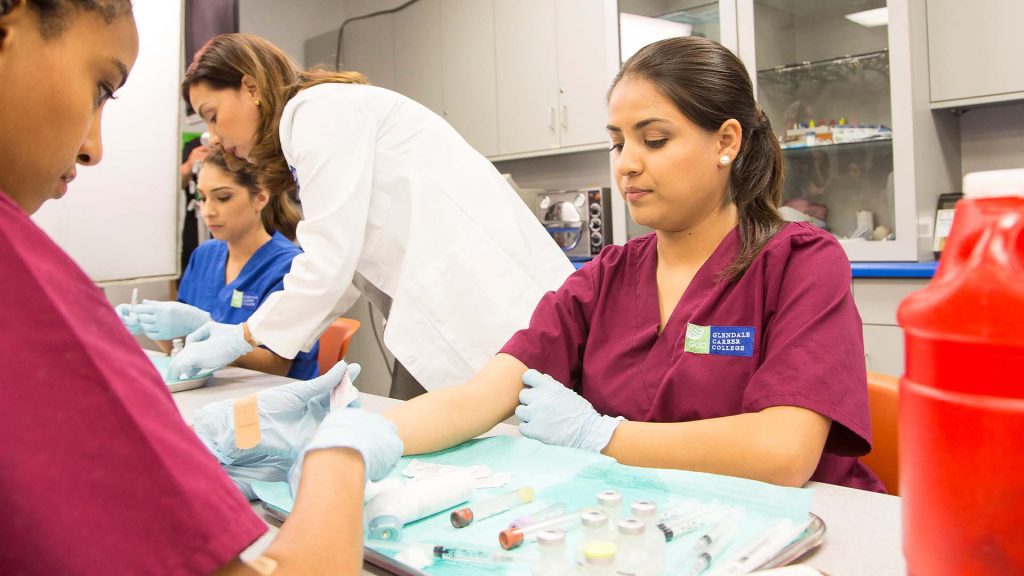
Quick Facts about Medical Assistants*
Medical Assistant Course Material
The Medical Assistant program is divided into eight class course modules plus a 144-hour clinical externship where students will apply the skills they learn in the classroom in an actual health care practice setting. After successful completion of the Medical Assistant program, the graduate will be qualified to work in doctors’ offices, general medical clinics or urgent care clinics. The student will be able to perform the duties required for examinations, use diagnostic equipment, perform laboratory duties, and function in all phases of the business office, including having a working knowledge of data input on the computer. Graduates will be qualified to accept entry-level or middle-level positions.
Seminar for Success
Orientation and success building course for Career Students. Review of basic math, language, vocabulary, and writing skills. Introduction to core career classes, availability of community resources, outlining, summarizing, managing credit, and other life skills. Outside preparation and study time, in addition to regular classroom activities, is required to complete the class assignments. The type of outside preparation may take the form of homework assignments, projects, reading, and required studying.
Medical History and Fundamentals
This course provides an overview of the roles and responsibilities of the medical paraprofessional and an introduction to medical specialties and subspecialties. This course introduces the student to the structures and functions of the human body. Topics include the history of medicine, the health care team and office environment, interpersonal communications, medical law and ethics, basic keyboarding, and medical terminology. Outside preparation and study time, in addition to regular classroom activities, is required to complete the class assignments. The type of outside preparation may take the form of homework assignments, projects, reading, and required studying.
Medical Office Administration
This course will introduce students to the basic procedures of the daily management of a medical office. Activities and simulation exercises related to practice management are provided throughout the course. Topics covered include telephone techniques; appointment scheduling; word processing projects including resumes and cover letters; insurance claims processing; constructing and managing patient records; medical office management software; and basic keyboarding. Outside preparation and study time, in addition to regular classroom activities, is required to complete the class assignments. The type of outside preparation may take the form of homework assignments, projects, reading, and required studying.
Anatomy & Physiology A
This course will focus on the respiratory and circulatory systems. Students will learn a variety of patient-care skills such as Venipuncture, ECG testing, and specialty exams. Students will practice skills introduced in this course through laboratory exercises. Outside preparation and study time, in addition to regular classroom activities, is required to complete the class assignments. The type of outside preparation may take the form of homework assignments, projects, reading, and required studying.
Anatomy & Physiology B
This course will focus on the lymphatic, immune, digestive, urinary and nervous systems. Students will learn related laboratory skills such as urinalysis and microscope use. Students will practice skills introduced in this course through laboratory exercises. Outside preparation and study time, in addition to regular classroom activities, is required to complete the class assignments. The type of outside preparation may take the form of homework assignments, projects, reading, and required studying.
Anatomy & Physiology C
This course introduces the student to the male and female reproductive systems, and the endocrine, integumentary, sensory, and muscular and skeletal systems. Students will practice skills introduced in this course through laboratory exercises. Outside preparation and study time, in addition to regular classroom activities, is required to complete the class assignments. The type of outside preparation may take the form of homework assignments, projects, reading, and required studying.
Medical Assisting Skills
This course introduces students to basic pharmacology and dosage calculation. Students will assist with medications, injections, and minor surgical procedures. The introduction of related practical skills such as surgical instruments and tray sets, medical asepsis, and sterile gloving are included in the course. This course covers behaviors influencing health, stress reduction, time management skills, and introduces alternative related therapies. Students will practice skills introduced in this course through laboratory exercises. Outside preparation and study time, in addition to regular classroom activities, is required to complete the class assignments. The type of outside preparation may take the form of homework assignments, projects, reading, and required studying.
Medical Assisting Skills and Response Training
This course introduces the students to office emergencies and first aid techniques. Basic Life Support training for the health care provider gives students the opportunity to become CPR certified. Students will practice skills introduced in this course through laboratory exercises. Students will discuss beginning their job search. Outside preparation and study time, in addition to regular classroom activities, is required to complete the class assignments. The type of outside preparation may take the form of homework assignments, projects, reading, and required studying.
Clinical Externship
Upon successful completion of classroom training, medical assisting students will participate in a supervised 160-hour externship experience in medical setting. This course is a requirement for graduation.
Medical Assistant Course Activities
Graduates of the Medical Assistant program routinely find entry-level positions working in health care offices and facilities, including private medical offices, clinics, hospitals, public health organizations, and other health care related organizations.
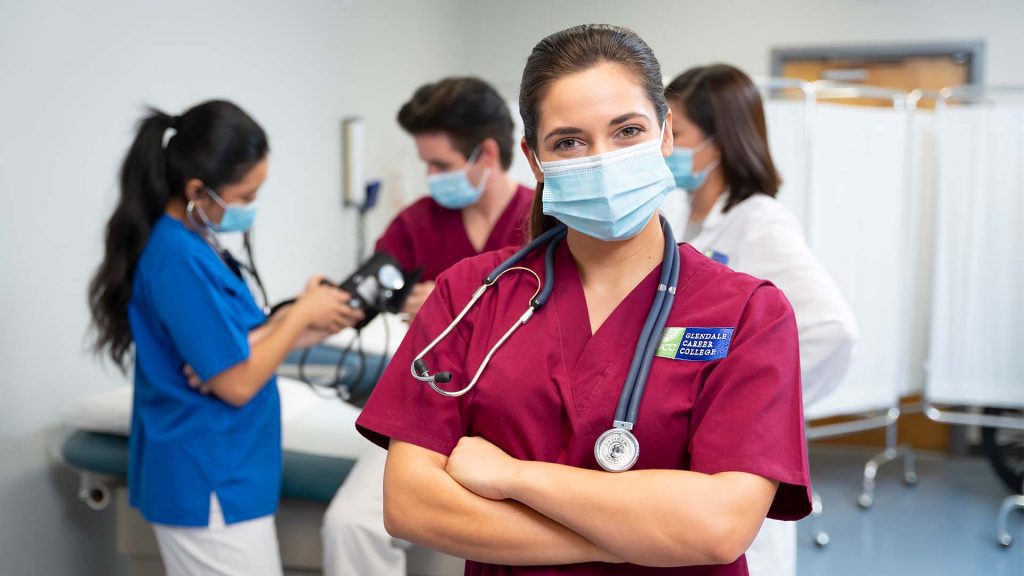
Medical Assistants typically perform the following tasks:
Request Information
Fill out a short form online and one of our admissions representatives will contact you to answer any questions you have.
Apply Online Now!
Ready to make your decision now? You can apply now online in under a few minutes.
Schedule a Tour
Come and see us in person! Talk to your future instructors, meet your future classmates and get familiar with your new home.
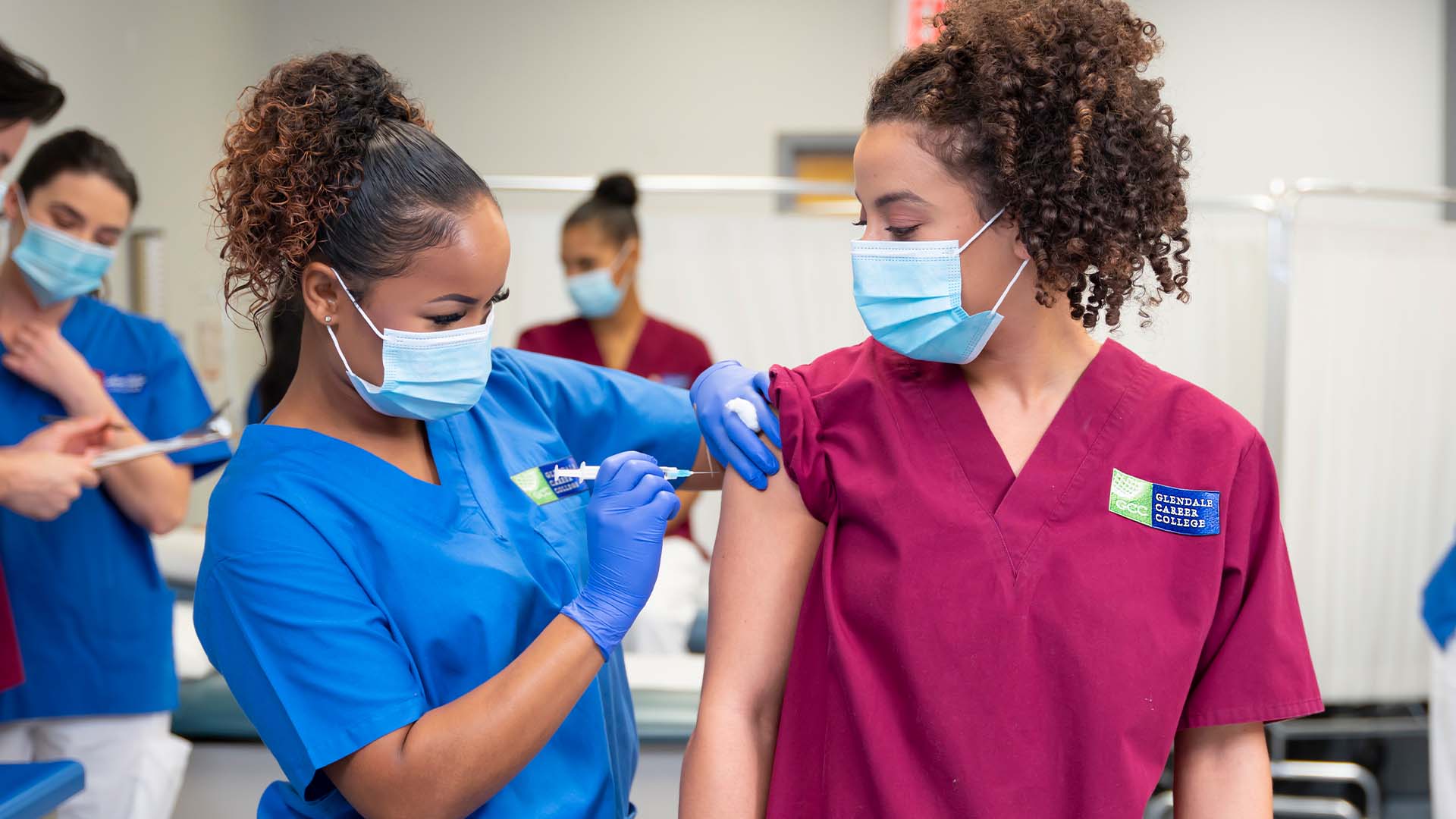
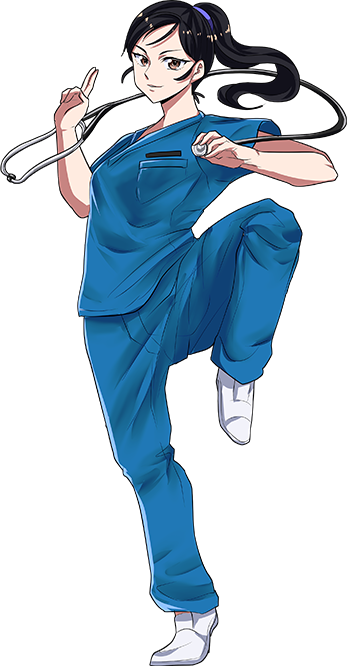
Medical Assistant Overview
Medical Assistants take on administrative and clinical duties to support doctors, registered nurses, and other medical professionals in doctors’ offices, clinics, hospitals, and other health care facilities.
Medical Assistants regularly carry out a number of crucial tasks, including:
The Medical Assistant program at Glendale Career College equips students with the knowledge and training they need to start working in a health care or medical office, including medical clinics, doctors’ offices, HMOs, rehabilitation centers, hospitals and other health care facilities.
*Glendale Career College is not able to guarantee employment.
Proudly accredited, licensed to operate and/or recognized by the following institutions:



Enroll at any of our schools and campuses located in Glendale, San Diego, near Burbank, Pasadena, Hollywood, Los Angeles, and more!
The Medical Assistant program can be taken at the following campuses:
Meet a Graduate
Questions?
Let us help you launch your career by contacting us today. Simply fill out our contact form or call us at 800-639-3384.
Classes are starting soon!
Medical Assistant Careers & Work Environment
The Medical Assistant program at Glendale Career College provides the education and training needed to begin a career working in a variety of different medical and health care facilities.
Graduates of the program routinely find jobs working in:

Quick Facts about Medical Assistants*
Medical Assistant Course Material
The Medical Assistant program is divided into eight class course modules plus a 144-hour clinical externship where students will apply the skills they learn in the classroom in an actual health care practice setting. After successful completion of the Medical Assistant program, the graduate will be qualified to work in doctors’ offices, general medical clinics or urgent care clinics. The student will be able to perform the duties required for examinations, use diagnostic equipment, perform laboratory duties, and function in all phases of the business office, including having a working knowledge of data input on the computer. Graduates will be qualified to accept entry-level or middle-level positions.
Seminar for Success
Orientation and success building course for Career Students. Review of basic math, language, vocabulary, and writing skills. Introduction to core career classes, availability of community resources, outlining, summarizing, managing credit, and other life skills. Outside preparation and study time, in addition to regular classroom activities, is required to complete the class assignments. The type of outside preparation may take the form of homework assignments, projects, reading, and required studying.
Medical History and Fundamentals
This course provides an overview of the roles and responsibilities of the medical paraprofessional and an introduction to medical specialties and subspecialties. This course introduces the student to the structures and functions of the human body. Topics include the history of medicine, the health care team and office environment, interpersonal communications, medical law and ethics, basic keyboarding, and medical terminology. Outside preparation and study time, in addition to regular classroom activities, is required to complete the class assignments. The type of outside preparation may take the form of homework assignments, projects, reading, and required studying.
Medical Office Administration
This course will introduce students to the basic procedures of the daily management of a medical office. Activities and simulation exercises related to practice management are provided throughout the course. Topics covered include telephone techniques; appointment scheduling; word processing projects including resumes and cover letters; insurance claims processing; constructing and managing patient records; medical office management software; and basic keyboarding. Outside preparation and study time, in addition to regular classroom activities, is required to complete the class assignments. The type of outside preparation may take the form of homework assignments, projects, reading, and required studying.
Anatomy & Physiology A
This course will focus on the respiratory and circulatory systems. Students will learn a variety of patient-care skills such as Venipuncture, ECG testing, and specialty exams. Students will practice skills introduced in this course through laboratory exercises. Outside preparation and study time, in addition to regular classroom activities, is required to complete the class assignments. The type of outside preparation may take the form of homework assignments, projects, reading, and required studying.
Anatomy & Physiology B
This course will focus on the lymphatic, immune, digestive, urinary and nervous systems. Students will learn related laboratory skills such as urinalysis and microscope use. Students will practice skills introduced in this course through laboratory exercises. Outside preparation and study time, in addition to regular classroom activities, is required to complete the class assignments. The type of outside preparation may take the form of homework assignments, projects, reading, and required studying.
Anatomy & Physiology C
This course introduces the student to the male and female reproductive systems, and the endocrine, integumentary, sensory, and muscular and skeletal systems. Students will practice skills introduced in this course through laboratory exercises. Outside preparation and study time, in addition to regular classroom activities, is required to complete the class assignments. The type of outside preparation may take the form of homework assignments, projects, reading, and required studying.
Medical Assisting Skills
This course introduces students to basic pharmacology and dosage calculation. Students will assist with medications, injections, and minor surgical procedures. The introduction of related practical skills such as surgical instruments and tray sets, medical asepsis, and sterile gloving are included in the course. This course covers behaviors influencing health, stress reduction, time management skills, and introduces alternative related therapies. Students will practice skills introduced in this course through laboratory exercises. Outside preparation and study time, in addition to regular classroom activities, is required to complete the class assignments. The type of outside preparation may take the form of homework assignments, projects, reading, and required studying.
Medical Assisting Skills and Response Training
This course introduces the students to office emergencies and first aid techniques. Basic Life Support training for the health care provider gives students the opportunity to become CPR certified. Students will practice skills introduced in this course through laboratory exercises. Students will discuss beginning their job search. Outside preparation and study time, in addition to regular classroom activities, is required to complete the class assignments. The type of outside preparation may take the form of homework assignments, projects, reading, and required studying.
Clinical Externship
Upon successful completion of classroom training, medical assisting students will participate in a supervised 160-hour externship experience in medical setting. This course is a requirement for graduation.
Medical Assistant Course Activities
Graduates of the Medical Assistant program routinely find entry-level positions working in health care offices and facilities, including private medical offices, clinics, hospitals, public health organizations, and other health care related organizations.

